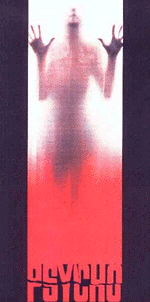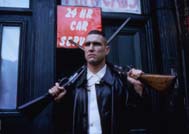
| In This Issue |
 |
| Lebed Interview |
| Good Clean Fun, Chez Lebed |
| Roundeye! |
| Negro Comix |
 |
 |

Given the increasing prevalence of carbon-copy cover tunes and succinct samples that qualify as songs in their own right--to put it bluntly, given the near total dearth of ideas in mainstream popular music since Sean "Puffy" Combs, i.e., Puff Daddy (as he apparently no longer wishes to be known, but which moniker I will adamantly continue to employ until my own demise later this year under suspiciously implausible circumstances), exploited a more talented friend's tragic death and Sting's unrelenting descent into physical ugliness and that embarrassingly narcissistic middle-aged senility of his (which makes Boris Yeltsin look like a gracefully aging elder statesman by comparison) to somehow become the late 1990s' Kenny Loggins and MC Hammer rolled into one without (and this is the really disturbing part) entirely forfeiting his street cred--it was only a matter of time before the trend crossed over into film, thereby providing Hollywood with a commercially viable excuse to cease its lackadaisical attempts at feigning inventiveness and wallow in self-referential involution and complete redundancy.
Not that cinematic repetition is anything new. To be sure, remakes have been around almost as long as the medium itself, often enabling spendthrift drug addicts to enjoy long, prolific careers in the movie business without actually having to come up with any new ideas of their own. On occasion, however, the remake genre has overcome its anti-creative origins to produce truly original art (it must be said, rather more frequently back in the early days of talkies, when several silent classics were redone with sound to net-positive effect)--the Bogart version of The Maltese Falcon and Evil Dead II: Dead by Dawn (despite that numeral in the title, still essentially a remake) spring to mind.
But then came sequels, with an implied pretense of being partially fresh, but which actually opened wide the gates of Repetitivland to scores of lazy actors, who were now free to go on reprising the same role indefinitely. Thus, The Godfather built its unique Oscar dynasty so that Police Academy might subsequently give sideshow acts like Bubba Smith and that sound-effects guy a permanent home on cable television (a medium with some pretty significant repetitiveness ramifications of its own, but which is beyond the scope of this little polemic). Even time itself has proved powerless to halt this phenomenon, insofar as characters can be written so as to age in direct correlation with the actors playing them (although in at least one case a freak equestrian mishap managed to derail a series whose speedy regression was especially impressive, in the process subjecting the actor in question to typecasting the restrictive likes of which not even Gary Oldman can claim). On the other hand, we do have the sequel to thank for pretty much the entire unlikely career of Talia Shire (even if the unmatched nepotism of brother Francis Copolla did play a fairly substantial supporting role).
More recently came the rediscovery of such stale sources of "new" material as wildly unpopular TV sitcoms of the not-so-distant past and Shakespeare. And now with the long-awaited arrival of Lucas's Star Wars prequel (and boy does it just give me a hard-on to ponder how that film is finally playing to its first civilian audiences as this very issue is being printed... and isn't it about time those superconsumerist freaks cleared the streets and returned to their parents' basements where they belong? I don't mean to sound superior--they're probably happier down there anyway), this underutilized genre should finally be given its due as a source of repetition in its own right rather than being looked down upon as the sequel's black-sheep cousin. It's breathtaking, when you think about it... so much redundancy achieved so early, so often, and so darn consistently by such a young medium.
Which makes it all the more astonishing that only now are motion pictures finally taking the remake concept to that coveted next level of superfluity. Some have labeled this new genre "re-creation," presumably as a deserved nod to the touchingly low-budget re-stagings of real-life events popularized by groundbreaking shows such as That's Incredible nearly two decades ago now (I'm far from the first cultural critic to note that television has repeatedly blazed new trails well in advance of its more distinguished elder sibling). As much as I'd like to commemorate the all-too-brief prime-time career of Fran Tarkenton, however, I prefer the rather unwieldy term "motion picture cover version." Indeed, the shot-for-shot remake would not have become possible, at least not in any mainstream commercial sense, were it not for the recent chart-topping exploits of the Puff Daddy and his numerous urban-adult-contemporary followers.
Of course, it should come as no great surprise that Psycho has become the first film classic subjected to the cover treatment. Aside from the fact that Alfred Hitchcock (Krazy Kevin's request of the week: if anyone even refers
 |
On the other hand, few would have predicted Gus Van Sant to be the first film cover artist. The nominally avant-garde auteur has had his share of inconsistency problems and he's undoubtedly an extremely lazy director. But his work, even at its very worst, has never been characterized by what you would call excessive repetitiveness. Often pretentious, but rarely redundant.
I guess Van Sant's newness to the whole repetition thing explains the frankly second-rate results he has achieved here. In fact, I'd even be willing to bet that there are literally dozens of failed musicians with film pretensions slaving away in Doors/Pink Floyd/Rutles tribute bands all over Hollywood right this very minute who could have produced more faithful cover versions of this particular movie. Why? Well, to use a musical analogy that seems particularly apt, no Rush cover band worth its salt would tolerate a bassist who goes around rewriting Geddy Lee's legendary fills. But that, in essence, is what Van Sant has done. Oh sure, the changes are subtle enough for the most part--an altered camera angle here, a faster-moving dolly shot there. But I'd like to meet the fellow who authorized Danny Elfman's gutless rearrangement of the original score (perhaps more well-known than even the film itself). And there's simply no excuse for the addition of a gratuitous Norman Bates masturbation scene, complete with the familiar cheek-slurping used in so many cinematic acts of onanism in the past. Hell, everybody knows that people in Arizona don't masturbate--least of all schizoid homicidal maniacs.
At times, I got the impression that Van Sant was being rather tongue-in-cheek with his homage, that his little variations were all in the name of shits and giggles. But if this were really case, wouldn't it have made more sense for William H. Macy to play the Lundegardian used car salesman? Disappointingly, he just ends up being the private detective.
Fittingly enough, the greatest insult I noticed is one that most viewers around the world probably won't even get to see. For whatever reason, several Moscow cinemas tend to be fairly incompetent when it comes to proper projection, often resulting in an image that is too narrow and too tall. Usually this only means an occasional boom mic poking into the top of the picture where it shouldn't be, but in the case of Psycho we get a gaffe that unintentionally produces the film's most disturbing moment, during the legendary shower scene, as luck would have it. There's chicken lady Anne Heche scrubbing away in her pale imitation of Janet Leigh, and meanwhile the distorted protection occasionally reveals a little too much breast. There's no nipple, though, just these bizarre oversized, flesh-colored coverall pasties (the kind worn by strippers in certain US states that have more-stringent-than-average public exposure laws on the books), which I guess is how all your really big stars film their nearly nude scenes. Then again, maybe lesbian tits look different from regular ones.
So, like that proverbial first pancake, this first ever motion picture cover
 |
It may come as some consolation to people who used to be fans of Sting that the man himself appears in another new film making the rounds this week, Lock, Stock and Two Smoking Barrels. Not to me, however. Sting has one of those throwaway cameo roles that practically screams, "I paid a million bucks as executive producer just to get a shitty little part in this stupid movie!" Surely a guy like Sting doesn't need to stoop to such levels, does he? Well, not entirely. In this case, anyway, he got his wife to be the executive producer. Sadder still is the way the aging process has transformed the former teen heartthrob into a dead ringer for Gennady Zyuganov, which fact is only
 |
Maybe someday people will stop making these stupid-criminal movies with convoluted plots. And maybe all these British directors will even stop remaking Trainspotting with a shittier soundtrack. On the plus side, we're probably still years away from having to deal with an actual remake of Trainspotting--let alone a bogus cover version.
The bad news is that this film apparently did well at Sundance or something. This means the incompetent director will probably get to waste a wad of money on another movie someday. His name is Guy Ritchie. Avoid him if you're able.


